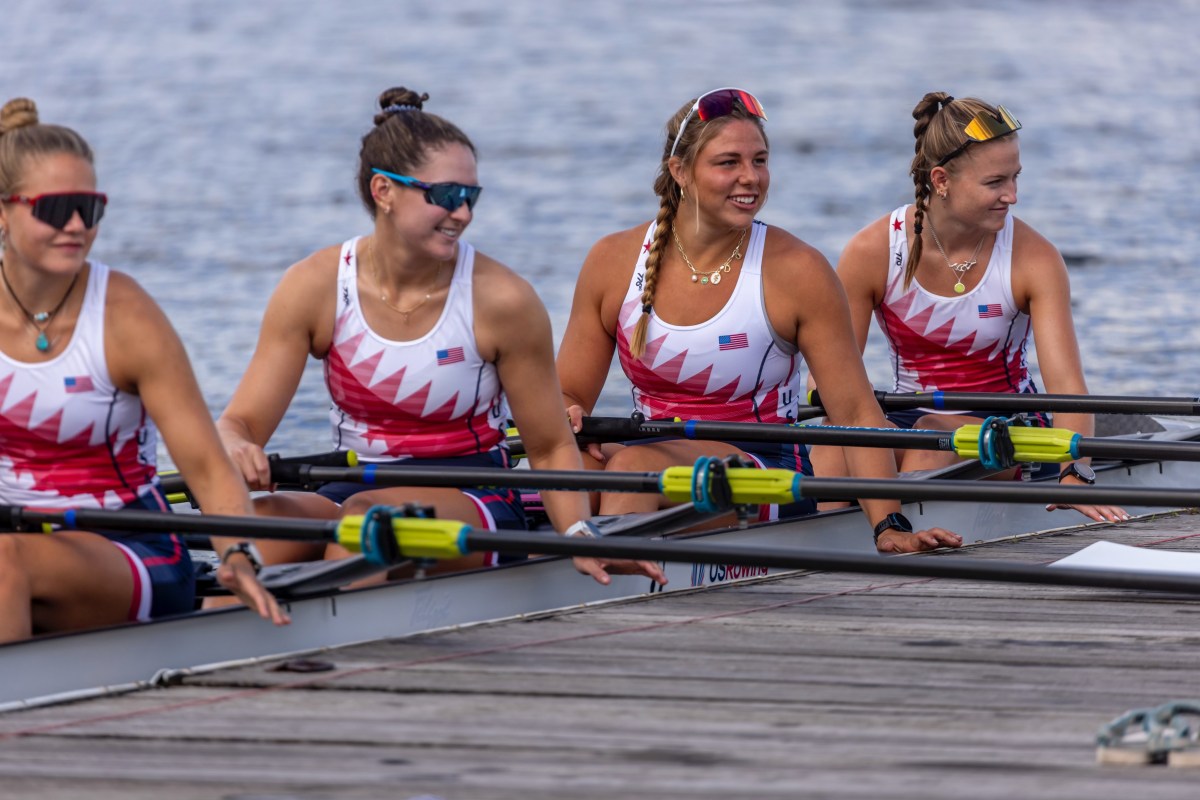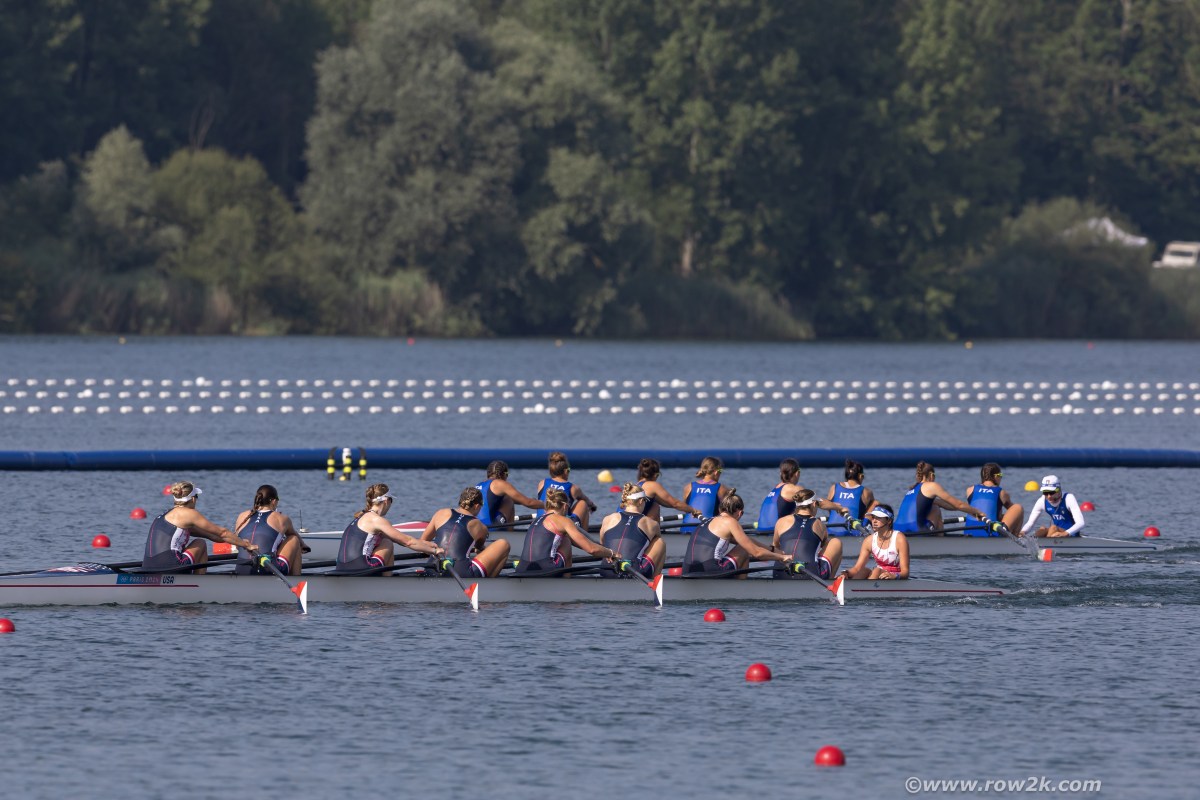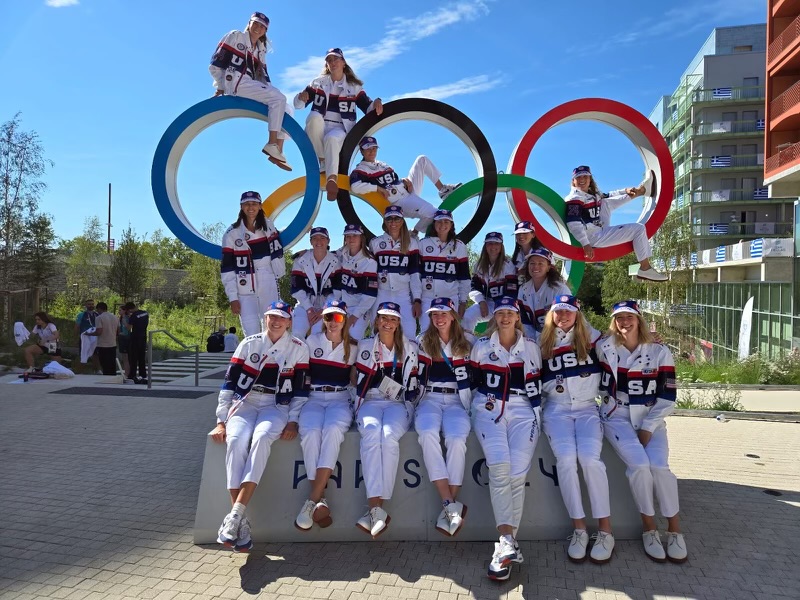This past August, 592 Americans headed to Paris to compete in the United States Olympic & Paralympic Games. More than half of Team USA’s athletes are women. The first female athletes debuted in the 1900 Paris Olympics. Over a century later, 338 women competed in the same city on Team USA. Of those 338 athletes, 24 of them are rowers.
“This was a really exciting Olympics for women,” Olympian Teal Cohen tells me. “It’s really cool to see. But within the community of Olympians, people have always cared about women’s sports. Sometimes I get stuck in my little bubble of Olympians where all we talk about and all we care about is women’s sports. And then you leave and you realize that’s not the real world.” Seeing the media pay more attention to the women at these Olympic games was, therefore, exciting for Cohen and her teammates. Cohen rowed the Women’s Quadruple sculls for Team USA this past August.
“I look up to Simone Biles, Katie Ledecky…there are women across sports, I watch their performance, their dedication, and their poise during interviews, I take note,” says Grace Joyce, who rowed alongside Cohen in the Women’s Quadruple sculls. “[We] come together and inspire each other, and it’s a powerful reminder to be your true self.”

Cohen (second seat) and Joyce (fourth seat) with their Women’s Quadruple Sculls teammates (Courtesy of Joyce)
The past two years have seen a huge boom in women’s sports, with athletes like Caitlin Clark, Ledecky, and Biles capturing the attention and hearts of audiences worldwide. But queer women have long had an affinity for watching women’s sports as well as playing them. This Olympics, Team USA featured the most openly LGBTQ athletes in history. Many of these elite queer athletes are on the women’s rowing teams.
Alina Hagstrom, the women’s alternative for Team USA, says she thinks rowing is definitely queer. “I got into elite rowing, and I was like, oh, wow. There are a lot of queer athletes here at this level,” she says.
I spoke with several queer Team USA members about their love of rowing, how they prepared for the race, and being queer athletes on the Olympic stage.
“I have a really deep love of the sport… I love the way that the boat moves,” Nina Castagna, the coxswain for the Women’s Eight event, explains. “But for me, it started because it’s a team, and it will always be the team.”
Joyce explains rowing as a hybrid sport in that it’s both an individual sport and a team sport. When you’re trying to make the team, coaches pay attention to individual performance and how rowers would fit into a lineup. “Then, in the end, it is a team sport and you’re in a boat,” Joyce continues. “Our result is kind of strictly dependent on how well we work together, how we communicate, and how we perform…It’s a fun middle ground for me, to improve on my own and be in control of my own stats and performance. But it is a team sport. In the end, I just like rowing. Getting the flow of the boat right is just unreal.”
Hagstrom also loves the team aspect of rowing. “Rowing to me is the ultimate team sport,” she says. “Once you’re in that boat, you’re not subbed out. You have to fully commit.”
The team is tight-knit, as most of them worked together at the same few training centers. The most talented collegiate athletes are invited to these centers to prepare for elite competitions, so many of them go from competitors to teammates overnight. “Some of my best friends on the team now were people that I was heavy competitors with in college,” Cohen says.
“I look up to a lot of these women… I had their trading cards!” Joyce adds. “It’s very cool to look up to somebody and to feel inspired, and then find yourself in the position where you are on a team with them. Then they’re your teammates and they become your friends.”
Castagna says spending time with teammates outside of rowing events is important, too. “The level of athleticism is so high that it’s such a mental sport,” she says. “Teamwork is necessary and it’s ingrained into it. Even if you’re not best friends, you have to be able to respect them and work well with them… I think you need a little bit of love!”

Castagna with her boat during the Eight event (Courtesy of row2k)
If you’ve been on the Olympic team previously, you receive a stipend based on performance while you train. However, many of the teammates work part-time jobs in addition to training, as the stipend is not enough money to live off entirely.
“Our coaches are very supportive of us working part-time jobs. Some people are in grad school… I think the ability to do that is making people stick around for longer,” Cohen tells me.
This Olympics, Flavor Flav learned that members of the Olympic women’s water polo team were working multiple jobs while training due to lack of funding. He reached out and agreed to sponsor the team so the athletes could focus on their sport.
“That was so good. We’ve gotta get someone to fund us too!” Cohen says.
At the elite level, the race is indeed a mental sport, the rowers emphasized to me. Sports psychology has gained popularity in recent years as part of a greater conversation around athlete mental health. Many Team USA members have worked with sports psychologists in anticipation of the Olympics.
Joyce sees a sports psychologist every week. “I have trained so much physically to prepare for the Olympics for four years,” she says. “Something that I kind of neglected was training the mental aspect.”
Cohen started working with a sports psychologist for the first time this year. “I have learned to manage the racing so much better than I did, and I thought I was good at it before,” Cohen explains. “I have no problem with training… I love the training. For me, it was learning how to handle being in a race.”
Competing in the Olympics is, for many, a once-in-a-lifetime opportunity. But the rowers stressed to me the importance of avoiding excess anxiety and preparing for the race like they would any other.
Czajkowski rowed in the Women’s Pair for Team USA and says she wasn’t necessarily more nervous for racing in the Olympics than for any other race. “You know how fast you are, you know how strong you are. You know how fit you are before the race actually happens,” Czajkowski explains. “Adrenaline is your body preparing to do a hard thing. So the feeling of nerves by themselves isn’t bad.”
The teammates have different pre-race routines. Czajkowski likes to listen to fun dance music before races, including Chappell Roan. “I used to listen to stuff that was, like, super, super aggressive and try to, like, channel it… the fun and happy music, I think, makes me feel like I’m gonna race better,” she says. Castagna lays her outfit out the night before and makes sure the warm-up is written in her notebook. “And then almost every single night before, I just visualize the race,” she says. “I just close my eyes, and I just, with no emotion, just walk myself through the plan, walk myself through how we’re gonna approach the race, just to make it feel like it’s not some big once once-in-a-lifetime thing that we’ve never done before, but rather, the execution of a plan that we’ve committed to a 100 times.”
“It’s hard to put words to… You have the chance to represent your country and sit on the line as Team USA. It’s a lot. I think it’s pretty raw and it’s pretty exciting. It’s one of your dreams. It’s your passion… you’re hitting this major milestone,” Joyce says.
After their respective races, Team USA could attend other competitions and explore the Olympic Village. There is a ticket lottery each day so the Olympians can win tickets to each other’s events. “I ended up courtside at a women’s basketball game. That’s probably my highlight,” Cohen says, smiling. She and several of the other rowers were able to watch Team USA versus Team Nigeria.
And, of course, there was great food in the Paris Village. “There were a lot of baguettes. I ate a lot of baguettes!” Cohen tells me.
There were LGBTQ events in the Village, most notably a “Pride House” hosted by Proctor and Gamble. The Village is divided into different houses representing the countries present at the game, but different brands can host houses as well.
Cohen says one of her favorite nights was at the Pride House. “There were so many Olympians, and I think having a smaller community to really get to know was really cool,” she says of the evening at Pride House. “The actual pride house, it was open to the public… and every night, that was where everyone was partying. Everyone wanted to be there.” An event that celebrated the LGBTQ medalists of the games was also an Olympic highlight for Cohen.
The increasing number of out LGBTQ athletes has had a positive impact on Team USA.
“[Sports] introduced me to more people who weren’t straight,” Czajkowski says. “Seeing other athletes who had come out and been okay, who have families, you know… it’s nice for me and nice for my family to see people whose lives have been on similar track.”
“I came out a little bit later, after college… On the women’s soccer team or basketball team or rugby team, wow, there are a lot of queer athletes, which is super cool… I think if I [saw] that in high school or even in college I would’ve thought, oh cool! That could be me too,” Hagstrom says.
“For me, it’s been really important to use my platform and use my voice to advocate for the next generation,” Cohen says. “Being a woman in sports alone is important enough to need to advocate for. But being queer as well, it is so important to really advocate. Being at the Olympics as a queer athlete was a really cool thing, to get to be involved in all those events.”
“Rowing has always been a welcoming place, especially women’s rowing,” she continues. “Stepping outside of that bubble sometimes and realizing that that’s how the rest of the world works, it’s just kinda scary. I’m trying to turn it into my identity as an athlete, not just as a rower, because I think there’s a lot of other sports where [queerness] is not normalized and less accepted.”

The women rowers of Team USA
What’s next for the 2024 women’s rowers of Team USA? Many are coaching or taking time off, while others are jumping right back into training.
“I definitely wanna go for 2028. I definitely do,” Cohen says. “I feel like in rowing, women tend to peak in their thirties. I have a lot of good years left in me.”
“We’re going to LA. We’re going to LA,” Joyce says.


